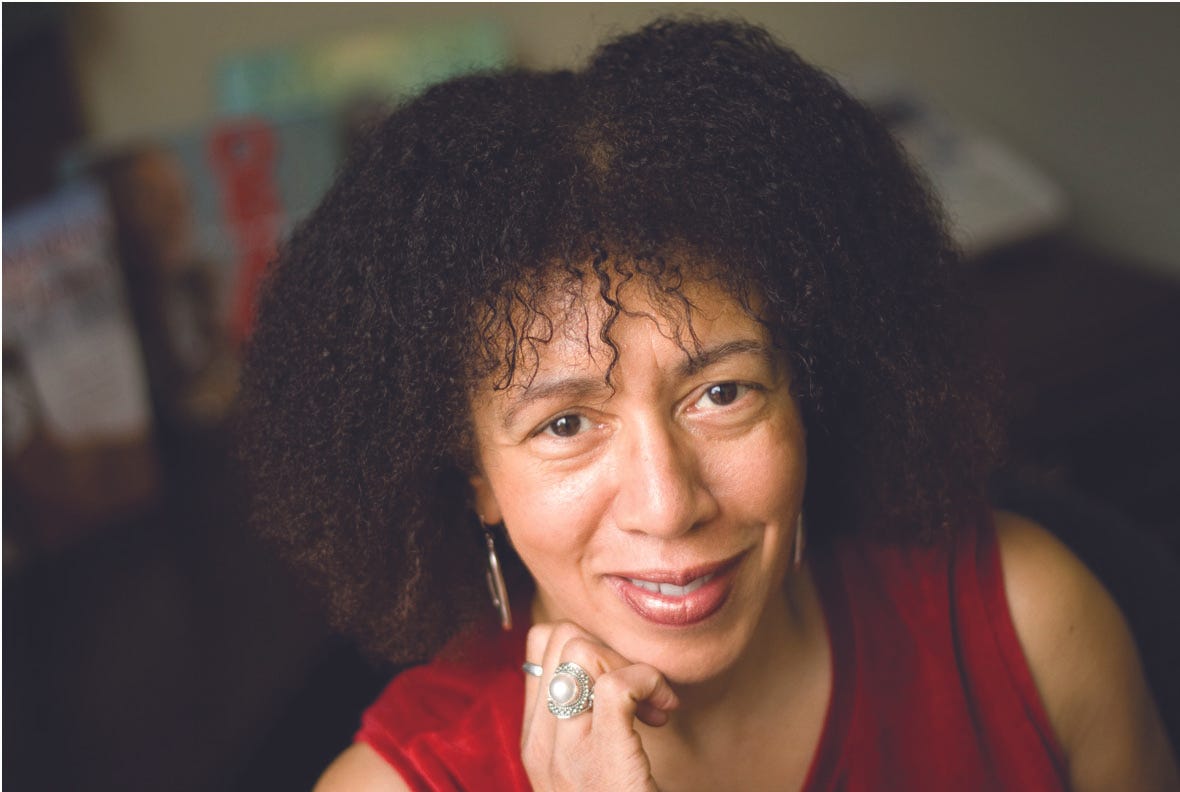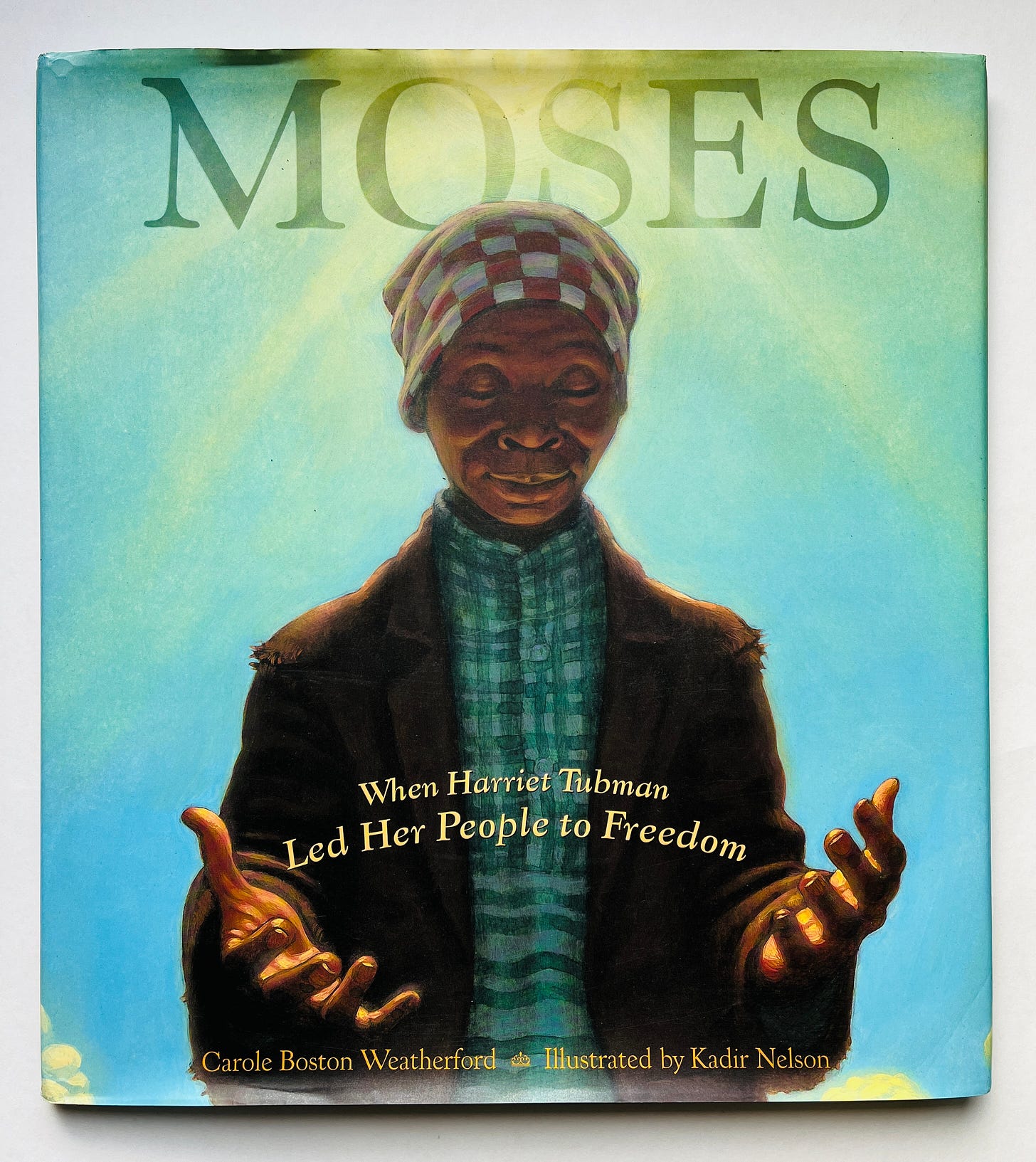My attitude toward reaching out to authors and illustrators for interviews for this newsletter is, “If you don’t ask, they can’t say yes.” When I started doing this, it didn’t really occur to me that I have zero media credentials; I just kind of thought, well, what do I have to lose? No one has ever said no, some of them never respond, many of them say yes and then graciously take the time to answer my questions.
I fully expected that Carole Boston Weatherford — an absolute powerhouse of an author, who has written so many priceless titles, in my opinion — would be too busy to even turn me down. So it was with enormous surprise — and pure gratitude — that when I sent her an email, she responded 14 minutes later with a yes.
It’s hard for me to pick a favorite among her works — you can see a full list on her website — but if I had to, it would be a tie between her Sidewalk Chalk: Poems of the City, which my children love for its cheerful and varied view of city life and Moses: When Harriet Tubman Led Her People to Freedom, which is so exquisite it’s hard to put into words. (Carole Boston Weatherford + Kadir Nelson = possibly my favorite author/illustrator team ever. Their work together is nothing short of breathtaking.)
I’m grateful that Boston Weatherford’s books exist and that there is a woman as brilliant as she is writing them — I hope she does it for a long time to come.
Here’s an edited bio, from her website:
Hailed by Huffington Post as a “master of picture book nonfiction,” Carole Boston Weatherford is a Newbery Honor author, New York Times best-seller and two-time NAACP Image Award winner. Since her 1995 debut, she has published 50-plus books including four Caldecott Honor winners. Six of her books have won Coretta Scott King Awards or Honors.
The Baltimore-born daughter of educators, Carole at age six dictated her first poem to her mother. Her father, a high school printing teacher, published some of her early poems on the press in his classroom. By middle school, she had transferred from an all-black public school to an exclusive private school. There, her eighth-grade teacher wrongfully accused her of plagiarism. That slight left her determined to use her writing to amplify marginalized voices. Now, her words stand as monuments to icons and unsung heroes alike.
Growing up, Carole found few Black characters in books. But when she became a mother, she shifted from writing for adults to creating children’s literature. Family stories, fading traditions and forgotten struggles inform her poetry, nonfiction and historical fiction.
With an M.F.A. in creative writing from University of North Carolina-Greensboro and an M.A. in publications design from the University of Baltimore, Carole is a professor at Fayetteville State University in North Carolina.
How long have you been writing and illustrating for children? What called you to this work?
Until I became a mother, I was focused on writing poetry for adults. Motherhood exposed me to a new, more inclusive crop of children’s books. As I read these books to my children, I wondered if I could write poetry for young people — not just the rhymes I recited to entertain my two toddlers, but books. My first children’s book, Juneteenth Jamboree, was published in 1995.
You’ve produced a number of outstanding (award-winning!) picture book biographies, especially about influential figures from Black history. How do you decide who to write about? What is your research process?
My picture book biographies are often encomia — also known as paeans or praise songs. My biographies have sung the praises of divas, athletes, jazz legends, photographers, and freedom fighters, among them Harriet Tubman, saxophonist John Coltrane, activist Mary Hamilton, and soul singer Aretha Franklin. I depict subjects whom I admire and I paint them as they might wish to be seen. My research varies from bio to bio. I use a range of primary sources, from quotations and images to music. I also consult secondary sources and rely on my own memories.
Poetry for children is a particular area of interest of mine. I’m intrigued by one of the professional presentations you do with your son, poet and illustrator Jeffery Boston Weatherford, called “Poetry, Hip Hop & Literacy” — can you tell us a bit about that?
Today, hip hop is the language of global youth culture. A vehicle for self-expression, hip hop gives youth validation and agency. Our professional development enables teachers to harness the power of hip hop in the classroom. The workshop covers the four pillars of hip hop, rap’s roots in oral traditions, and its use of poetic elements. We show documentaries and study how rap influences pop culture, politics, and commerce. Finally, we get students to write homages, confessional lyrics, social commentary and/or advertising jingles. My son and collaborator, Jeffery, amps up the excitement by showing educators how to create and perform their own lyrics.
Do you have any advice for parents, other caregivers, and educators about reading?
Reading material is as necessary as food. Keep it interesting by feeding your children different genres and types of reading materials. Offer them books about their interests. In that regard, the library is your best friend. Read to and with children, regardless of age. And of course, model the behavior. Let them catch you reading!
What are a few titles, recent or otherwise, that have stood out to you as being so excellent you wish they were on the shelf in every home and classroom?
I’m going to cite some classics, a few of which are digitized online:
Adult books
The Black Book edited by Toni Morrison
Born in Slavery: Slave Narratives from the Federal Writers' Project, 1936 to 1938 (collected by the Library of Congress)
A Red Record: Tabulated Statistics and Alleged Causes of Lynchings in the United States, 1892-1893-1894 by Ida B. Wells
Children’s books
Ashanti to Zulu by Margaret Musgrove
Mufaro’s Beautiful Daughters by John Steptoe
Tar Beach by Faith Ringgold
What’s next for you? Are you working on anything new you can tell us about?
I’m most excited about KIN: Rooted in Hope, a verse novel illustrated by my son Jeffery. It’s a fictionalized account of our ancestors’ lives at Wye House, the Maryland plantation where Frederick Douglass was also enslaved. The narrative follows our kin to the all-black enclaves of Unionville and Copperville that my great-great grandfathers co-founded during the Reconstruction. (Ed: KIN came out in September 2023 and is stunning.)
An enormous thank you to Boston Weatherford for her time (and patience! Publishing this has been a long time coming).
For more information about her work, visit her website. And be sure to seek out her books at your local library and bookstore, or order them online — they’re amazing, pretty much every single one.
Thanks for reading today, and always,
Sarah
P.S. Bookshop.org links are affiliate ones — I get a tiny commission if you use any of them to make a purchase, and I appreciate your support.







Great interview! I will definitely check out her books.
Mufaro's Beautiful Daughters is one of my favorites. This was such a pleasure to read. Thank you for this interview!